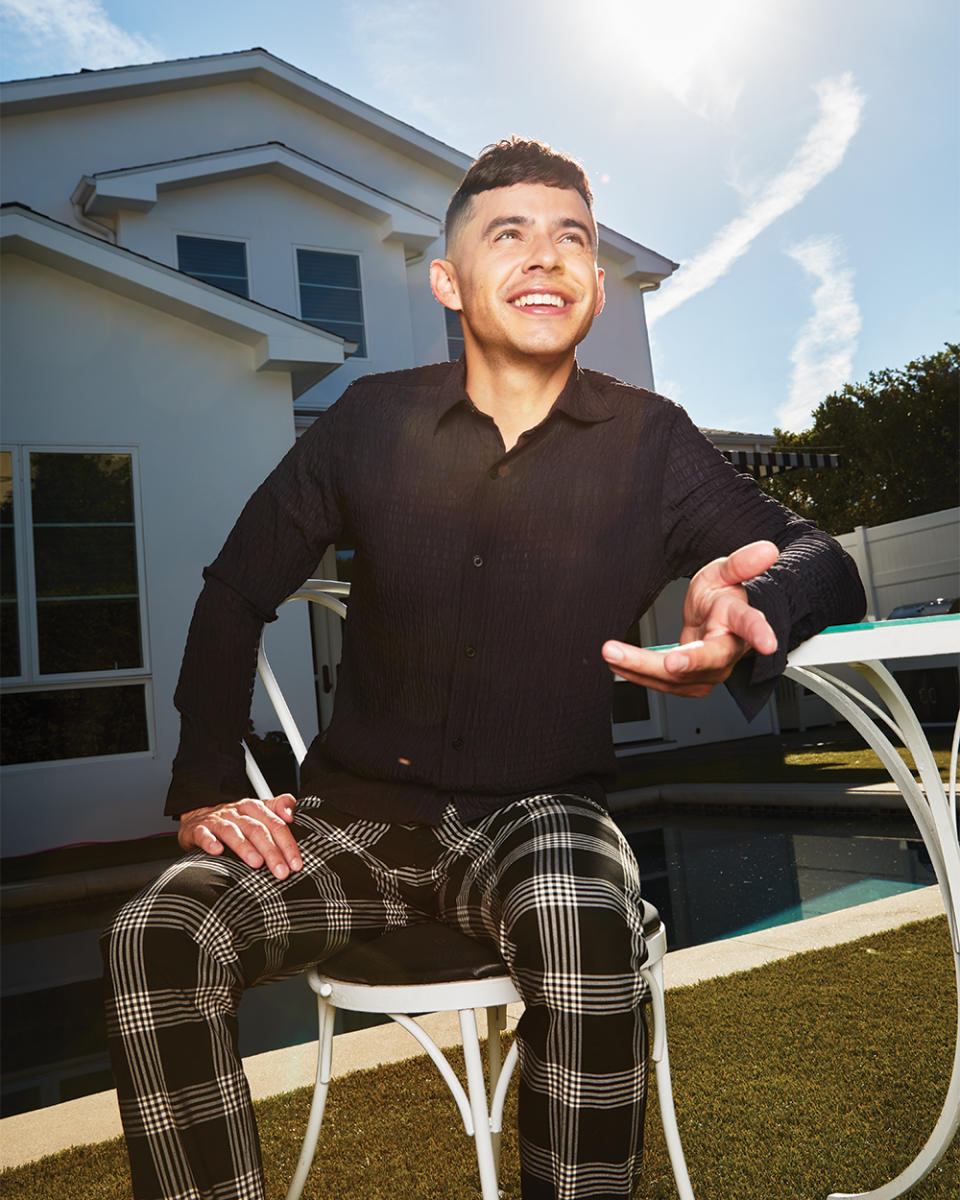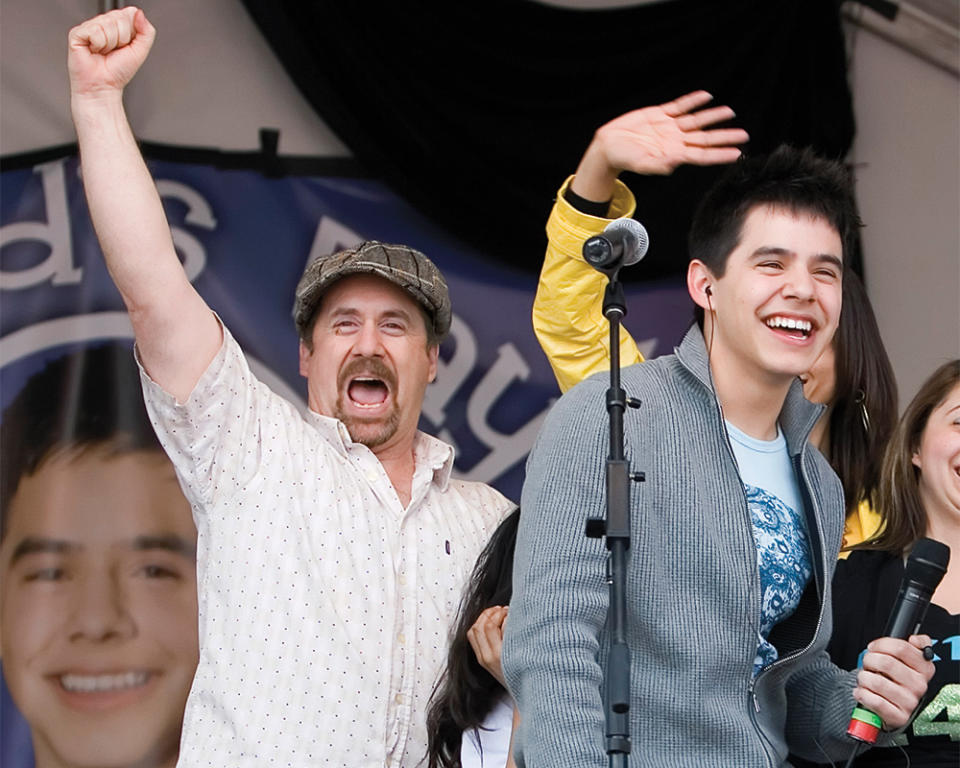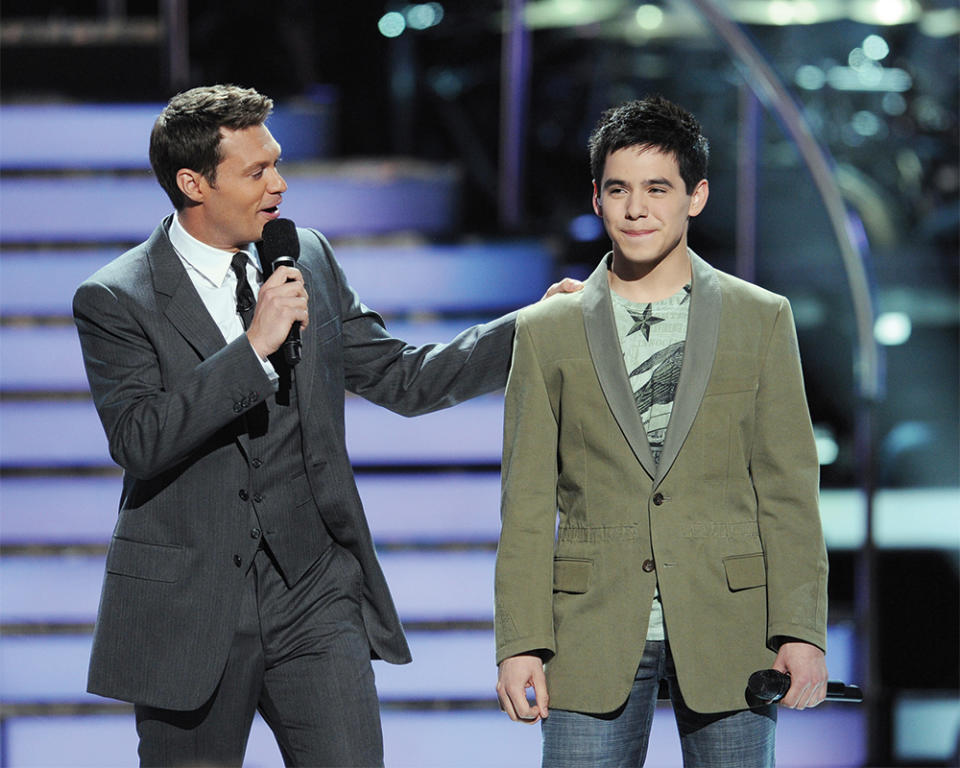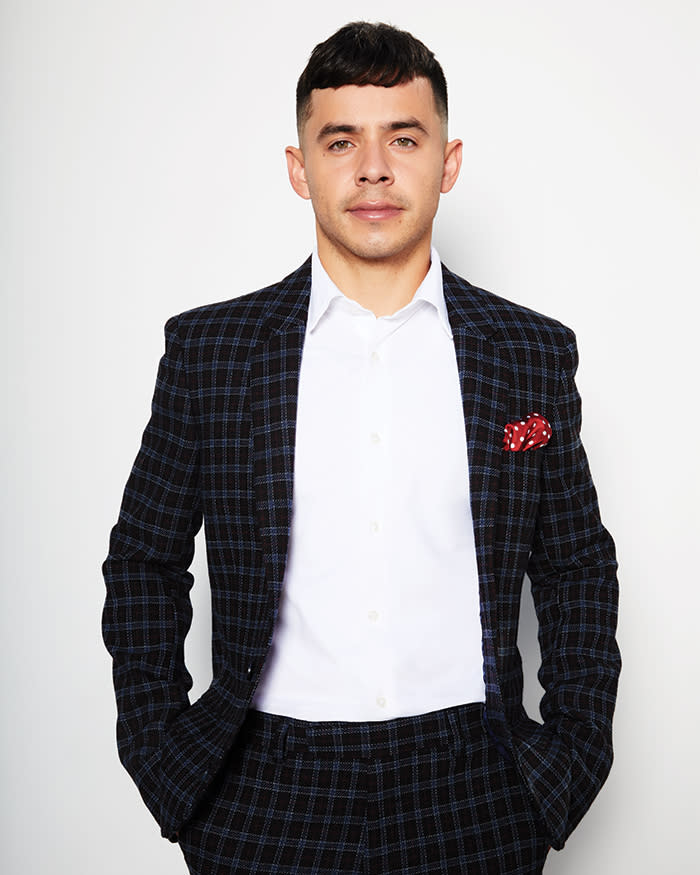David Archuleta Lost Control of His Life on ‘American Idol.’ He Came Out as Bisexual to Get It Back
- Oops!Something went wrong.Please try again later.
- Oops!Something went wrong.Please try again later.
- Oops!Something went wrong.Please try again later.

It was round two of the semifinals on Season 7 of “American Idol,” and David Archuleta had just closed the Feb. 28, 2008, episode with John Lennon’s “Imagine.” The performance — a master class in immaculate pop vocal precision — earned the then-17-year-old wild screams from the tween and teen girls in the studio audience and instant raves from the judges. Randy Jackson told Archuleta he was “born to do exactly what you’re doing.” Paula Abdul gushed that he was “destined for superstardom.” And Simon Cowell proclaimed, “Right now, you’re the one to beat.”
In that moment, with his father, Jeff, beaming from his seat just feet away, Archuleta knew he should be nothing but grateful for the praise. Instead, one thought kept drumming through his head: “I don’t want to be here anymore.”
More from Variety
Between Pop-Stardom and Parenthood, Katy Perry Still Finds Time to Empower Others
Dancing His Way Onto Hollywood's Walk of Fame: Nigel Lythgoe Reflects on Storied Career
He didn’t understand why those girls were screaming, let alone why tens of millions of people would vote for him week after week — ultimately catapulting Archuleta to the finale, where he would finish second to David Cook. He didn’t understand, either, why older male fans kept yelling at him to come out already, or why his own father would tell him about online speculation about his sexuality like it was hot gossip. He was overwhelmed by the unrelenting schedule. He hated being pitted against other singers. He desperately missed his family back home in Utah. Fundamentally, Archuleta didn’t know that he wanted any of this at all.
“I felt so disconnected from everything,” he says now, perched on his publicist’s couch on a scorching Los Angeles day in October. “Like, 13 years later, I’m piecing together what actually was going on. But it’s still a process because I still don’t understand why people were so into it.” Now 30, the singer breaks into a nervous laugh familiar to anyone who watched him on “Idol.”
“I think I was just in protection mode the whole time,” he says. “If anything, I was putting a wall between me and everyone else.”
Last June, Archuleta tore down that wall with an Instagram post in which he came out as being a member of the LGBTQIA+ community. The decision came after Archuleta — a lifelong and devoted member of the Church of Jesus Christ of Latter-day Saints — says God told him to share his story with the world, and Archuleta obliged by picking up his phone, writing the post and sending it without telling anyone in advance other than one of his sisters. Archuleta instantly became one of the most high-profile members of the Mormon faith to be openly LGBTQ, which has put him at odds with his church’s prohibition against acting on same-sex attraction — although Archuleta’s asexuality, which he also revealed in the Instagram caption, has made that particular hurdle a bit less onerous to navigate.
Still, it’s a journey that has been both bewildering and excruciating, pushing Archuleta to the brink of his religious beliefs and his desire to live at all. In a nearly three-hour conversation with Variety, it’s also clear that Archuleta’s coming-out post was the latest, most significant step in his decade-long struggle to wrest back the control of his life — and career — that he believes he lost that fateful February day on the biggest TV show in America.

Michael Buckner / Variety
When Archuleta was on “Idol,” he was perpetually abashed and tongue-tied, straining to string together a few sentences even when host Ryan Seacrest tossed him the easiest softball questions. As an adult, he does not have that issue. He’s retained his boyish, aw-shucks charm, but his words now tumble out of him, undaunted by even the most personal disclosures.
“My parents never talked to me about puberty,” he says. “I didn’t know what wet dreams were. I didn’t know what arousals were. I didn’t know that hair was going to be growing in parts of my body. All that was foreign to me. I didn’t know. And so I was freaking out.”
Archuleta says this by way of explaining his understanding — or, rather, his utter lack of it — of what being gay means as the second oldest of five siblings in a Mormon family that was increasingly frayed by his parents’ disintegrating marriage. He was home-schooled for most of his childhood, especially after his father began showing off Archuleta’s natural gifts as a singer: on “The Jenny Jones Show” at 11, on “Star Search” at 13, and as soon as he was eligible, auditioning for “Idol” at 16.
Looking back, Archuleta says his time on “Idol” was “miserable” and “traumatic.” Most of his fellow finalists, he says, had some kind of nervous breakdown at some point during the season. And yet he winces every time he speaks ill of the show.
“I get afraid to blame things on ‘American Idol,’ because something in me is programmed to say, ‘I have to be grateful, because where would I be without it?’” Archuleta says. “But at the same time, I’ve talked to other ‘American Idol’ contestants about how we all have trust issues. Like: ‘You can’t trust anyone anymore, not even your own family.’ That’s what we were told. It was like some weird grooming process, from the very first audition, the way that they were speaking to us, kind of like, ‘You’re powerless little bugs. If you step out of line, then you’re out of here, and you’re going to lose this once-in-a-lifetime opportunity.’”
When reached for comment by Variety, former “American Idol” executive producer Nigel Lythgoe does not dispute Archuleta’s account. “I had a wonderful time working with David and was totally unaware of his grievances,” Lythgoe says in a statement. “I’m so sorry he has a bad recollection of his experiences on the show. He did so well in the competition, and his battle with David Cook provided an extremely exciting Finale.”
Archuleta’s father did indeed become a difficult presence as his son’s star began to rise on the show, but when Archuleta confided in “Idol” staffers about it, somehow his concerns wound up on TMZ. “Anything to make it look like my dad is this evil man and poor little helpless David,” Archuleta says now with far more anger than he ever allowed himself on “Idol.”

AP
It was destabilizing in the extreme, and scarcely could have happened at a worse possible moment for a queer Mormon kid with a million questions about himself and no one he felt he could turn to for answers.
“It’s been quite a journey for him to just know who he is,” says Melinda Doolittle, who came in third on Season 6 of “American Idol” and befriended Archuleta. “When you do something as transformative as ‘Idol’ when you’re still figuring it all out, sometimes it’s very easy to let other people figure it out for you. So I’m really proud of him for shutting that noise out.”
In December 2011, Archuleta announced he would spend two years serving a Mormon mission in Chile. It was, he says with a chuckle, an act of “rebellion” against the unceasing pressure he felt from all sides to transform his popularity on “American Idol” into a viable — and lucrative — music career, at the cost of any personal life or self-awareness. His first single, “Crush,” went double platinum, and yet Archuleta had never once had a crush of his own.
“It was not a feeling I ever allowed myself to feel,” he says. From his earliest memories, his only conception of a relationship between two people was the covenant of marriage between a man and a woman that is the foundation of the LDS faith. (Unbidden, he breaks into the unironically titled Mormon hymn “Love Is Spoken Here” to illustrate: “I see my mother kneeling with the family each day … with father and mother leading the way.”) When he was a kid, any flutters of feeling for, say, an animated Disney prince were immediately tamped down. By the time he was old enough to examine them, Archuleta was a household name with a major recording contract and a worldwide tour to support it.
After his first, self-titled album went gold in November 2008, Archuleta says he informed his label, Jive Records, that he wanted to go on his mission, but he was rebuffed, told he was contractually obligated to deliver more music.
“I naturally kept dragging my feet,” he says. “I know it was very difficult, because they’re like, this is a good kid, he’s talented, but he’s not reaching his potential as an artist, because he’s not willing to record the songs that will get him to where he can be successful. But I don’t want to be successful if it means I’m not going to have any time to process what I need to as a human being.”

Michael Becker / TM and Copyright © 20th Century Fox Film Corp.
His next album of originals, 2010’s “The Other Side of Down,” fizzled out, and Jive dropped him the following year. He was, at last, free to go on his mission. Just about everyone in his life was unhappy. He was thrilled.
“I need quiet and alone time, and from the moment ‘American Idol’ auditions began when I was 16 to when I was 21, I never had that,” he says. As he lived and worked in Chile in a mission just south of Santiago, he had the space to begin to look at himself and recognize his attraction to other men. And yet, by the time Archuleta sat down with his mission president in Chile to finally come out to someone, he was still so disassociated from his own life that he couldn’t remember why he’d made the appointment. He had to refer to his journal to remind himself.
In 2014, he came out as gay to his family, who responded well, but that didn’t quite feel right either. He still felt some attraction to women — and, more crucially, the gravitational pull of the Mormon church’s singular devotion to heterosexual families.
“I thought, like, I may be attracted to guys, but eventually, I’ll be able to make marriage work because that’s just how it is,” he says. “Marriage between a man and a woman is ordained by God. That’s the standard. I’ve been trying all my life to fit that standard and make it work.”
So Archuleta began dating women and ignoring his interest in men. He also knew that while his attraction to both genders was real, his sexual drive was not like that of other men he knew, gay or straight; he needed a close, intimate connection first. It was certainly helpful in keeping to the LDS tenet of chastity before marriage. But the elemental lack of trust drilled into him on “Idol” had become as bone deep as his conviction that he had to marry a woman to be happy.
The combination proved untenable: Letting anyone get truly close meant exposing a side of himself he’d been taught was incompatible with living a godly life, and the seething anger and resentment that were stoked in Archuleta terrified him. His life was still not truly his own, and after a relationship with a girlfriend fell apart in May, he found himself in an especially dark place.
“I felt like I was burying a body and it wouldn’t ever die, because it’s me,” he says. “[I was] getting to the point of, like, if I need to bury this, I need to bury myself with it. I was thinking it was better off for me to not even exist, because I don’t want to be a way that God doesn’t want me to be. At that point, I was like, if He’s not there, then why does this even matter?”
At his home in Nashville, he fell to his knees and began a prayer he’d made countless times before: “God, please take this away from me. If you’re there, and if you really have a plan for me, please change me. I know you can change things. You could change water into wine! You can change me.”

Michael Buckner / Variety
Archuleta, his eyes cast in fervent concentration on the floor, says this all in one unbroken thought: “And I finally heard Him, the way He’s always answered me. The way I knew I needed to go on my mission, the way I needed to go through with ‘American Idol’ even though I didn’t want to. He just said, ‘David, you need to stop asking me this. You’re asking me the wrong thing. You need to stop asking me to change you in a way I don’t intend to change you. I intended to create you this way, and now you need to understand why. And you need to take the time to understand it.’”
He stops to catch his breath. “I was just kind of like, What? I was not expecting God to tell me something that I didn’t think was godly, you know?”
A month later, Archuleta came out on Instagram, announcing that he is on “a spectrum of bisexual.” Given how hideous the internet can be, he worried he’d opened himself up to a torrent of hate, but he says both online and in his life, the vast majority of responses have been supportive. In his local LDS congregation in Nashville, in fact, several people have since come out to him.
“I realized there’s so many of us, but they’re invisible,” he says. “That’s when, OK, I see now why I was put where I am, and why I need to speak up.”
He’s already started. After Jeffrey R. Holland, an LDS elder and former president of Brigham Young University, gave a speech at BYU in which he called for “more musket fire” in defense of the church’s stance on same-sex attraction and marriage, Archuleta responded with a lengthy video post to Instagram asking for more “hard conversations” and better understanding between LDS leadership and the LGBTQ community.
He’s reticent to talk much about his dating life, but he allows that he’s beginning to grasp that his bisexuality manifests in an attraction to androgyny in both genders. “Maybe I shouldn’t … ” he says to himself before diving in with a wide, toothy grin. “There are a lot of very attractive lesbians — the ones who, like, have a masculine energy to them.”
Archuleta’s music career is also in full gear; he’ll go on a COVID-postponed tour next year to promote his 2019 album, “Therapy Sessions.” And he’s in the middle of a series of Christmas gigs, including a performance in Texas with the Turtle Creek Chorale, a predominantly gay men’s chorus — a first for Archuleta (whose 2010 performance with the Mormon Tabernacle Choir on the church’s holiest night has garnered millions of views on YouTube). He expects there will be a lot of that kind of thing in his future.
“This is still new for me, but I feel good about it,” he says. “I don’t have to be someone else. I’m just holding this part of me with more grace and without shame. I don’t feel like I have to hide anything anymore. And it’s such a relief.”
Best of Variety
Sign up for Variety’s Newsletter. For the latest news, follow us on Facebook, Twitter, and Instagram.

